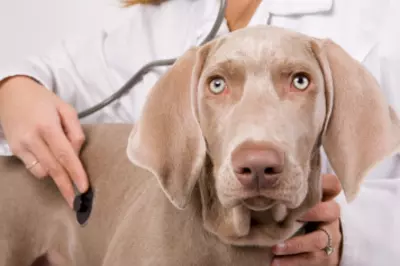How Can I Calm My Pet When Going to to the Veterinarian?

Question: My dog freaks out whenever he goes to the vet. How can I help him calm down?
Answer: Jane Armstrong, DVM, MS, MBA, Diplomate ACVIM, currently a professor in the Veterinary Clinical Sciences Department at the University of Minnesota replies. Some animals suffer the same “white coat” syndrome as their owners, where routine medical appointments turn into anxiety-filled endurance tests. Many pet lovers turn to synthetic sedatives, and sometimes they work well. Sometimes they don’t, resulting in vomiting, increased agitation, or an animal too sleepy to stand. Behavior modification, long-used by trainers and adopted by holistic vets, could address your dog’s anxiety about veterinary visits. Be sure that your dog is used to rides in the car and doesn’t associate car trips only with visits to the vet. With the assistance of the veterinary clinic, “deconditioning” can be further extended by taking your dog to the clinic for innocuous procedures like weighing. Be sure to provide lots of positive rewards during these outings.
If you wish to try some other approaches, talk to your vet about some of the following suggestions:
- Valerian root 30-45 minutes before leaving for the appointment (roughly 1 capsule for 40 lb.)
- Rescue remedy, a combination of bach flowers (8-10 drops on the tongue of a 60 lb. dog or 4-5 drops on the tongue of a small dog or cat). Rescue remedy can also be sprayed into the exam room in a 5-10% solution.
- Dog and cat pheromones, DAP (dog appeasing pheromone) and feliway, may exert a calming influence and can be sprayed in the pet’s carrier or in the exam room, and they also come in plug-in electric diffusers.
- Acupuncture. Immediately upon arriving at the clinic, a veterinarian skilled in acupuncture may consider inserting an acupuncture needle into a point on the midline between the ears (gv-20), which can exhibit a marked calming influence in about 10 minutes.
Many owners looking for a new way to address pet health are now checking out holistic veterinarians. Holistic (or integrative) veterinary medicine is the examination and diagnosis of an animal that considers all aspects of the animal's life. Holistic vets combine conventional and complementary treatments to create a tailored health regime for your pet.
Besides giving your pet a comprehensive physical exam, a holistic veterinarian will inquire about behaviors, distant medical history, and environmental factors like diet, hygiene, family relationships, and emotional stresses. With this comprehensive profile, s/he may prescribe a complementary therapy. The most commonly used treatments are acupuncture, chiropractic, herbs (oriental or other herbs, such as echinacea, red clover, grape root, dandelion root and hawthorn) and nutritional therapy. Other treatments, such as massage, are growing in popularity, particularly for elderly or working animals.
Experts say that complementary care works best when used in the same manner that seems most effective for humans: as an adjunctive treatment. And as is often the case with complementary medicine for people, comprehensive, well-controlled studies of specific complementary veterinary therapies have yet to be completed. But practitioners, pet owners, and even conventional vets agree that experience is often compelling enough evidence. If an animal acts, walks, eats, or responds better after a complementary therapy, it is most likely successful.
A conventional vet can often refer clients to a complementary practitioner with whom s/he will then coordinate care, or you can check out the American Holistic Veterinary Medical Association at www.ahvma.org. For owners in the Twin Cities (St. Paul/Minneapolis) area, there is an Integrative Medicine service at the Veterinary Medical Center at the University of Minnesota: www.cvm.umn.edu/vmc.


